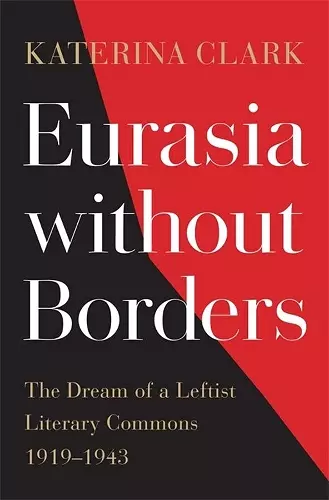Eurasia without Borders
The Dream of a Leftist Literary Commons, 1919–1943
Format:Hardback
Publisher:Harvard University Press
Published:26th Nov '21
Should be back in stock very soon

A long-awaited corrective to the controversial idea of world literature, from a major voice in the field.
Katerina Clark charts interwar efforts by Soviet, European, and Asian leftist writers to create a Eurasian commons: a single cultural space that would overcome national, cultural, and linguistic differences in the name of an anticapitalist, anti-imperialist, and later antifascist aesthetic. At the heart of this story stands the literary arm of the Communist International, or Comintern, anchored in Moscow but reaching Baku, Beijing, London, and parts in between. Its mission attracted diverse networks of writers who hailed from Turkey, Iran, India, and China, as well as the Soviet Union and Europe. Between 1919 and 1943, they sought to establish a new world literature to rival the capitalist republic of Western letters.
Eurasia without Borders revises standard accounts of global twentieth-century literary movements. The Eurocentric discourse of world literature focuses on transatlantic interactions, largely omitting the international left and its Asian members. Meanwhile, postcolonial studies have overlooked the socialist-aligned world in favor of the clash between Western European imperialism and subaltern resistance. Clark provides the missing pieces, illuminating a distinctive literature that sought to fuse European and vernacular Asian traditions in the name of a post-imperialist culture.
Socialist literary internationalism was not without serious problems, and at times it succumbed to an orientalist aesthetic that rivaled any coming from Europe. Its history is marked by both promise and tragedy. With clear-eyed honesty, Clark traces the limits, compromises, and achievements of an ambitious cultural collaboration whose resonances in later movements can no longer be ignored.
Ambitious and engrossing. -- Caryl Emerson * Times Literary Supplement *
The scale and scope of Katerina Clark’s Eurasia without Borders match the contours of its subject: a grand vision of a leftist literary commons that might unite the peoples of interwar Eurasia…Clark marshals her cast of characters and organizations into a coherent narrative that never feels simplified or reductive. Anyone remotely concerned with the history of global socialism or world literature cannot afford to ignore it. -- Edward Tyerman * Russian Review *
This magisterial book is indispensable for the study of world literature. Clark’s meticulous close readings, extensive archival research, and personal interviews offer captivating details and discoveries. She draws our attention to many writers and artists who are not generally considered within the traditional narrative of world literature and are therefore only known well in regional studies. -- Xiaolu Ma * Modern Chinese Literature and Culture *
[A] bold new study…It’s a mighty tale that ventures well beyond the usual scope of world literature, and timely too. Eurasia is back if you hadn’t noticed. -- Nicholas Jose * Australian Book Review *
A powerful political history of world literature. From the Baku Congress to Mao’s Yan’an Talks, Eurasia without Borders fundamentally remaps the interconnected literary cultures of Europe and Asia. Clark illuminates how the literary international emerged in the wake of the Bolshevik Revolution to transform the world and, by extension, the very idea of world literature. -- Lydia H. Liu, author of The Clash of Empires: The Invention of China in Modern World Making
During a crucial era of decolonization, the Comintern fostered Marxist solidarity across Eurasia that would shake the imperial orthodoxies of the time and shape the postcolonial writing soon to come. Clark skillfully narrates a chapter in the history of world literature whose importance, though previously overlooked, cannot be overstated. -- Siraj Ahmed, author of Archaeology of Babel: The Colonial Foundation of the Humanities
Clark’s revelatory account of world literature recasts the vision of a Red East under the shadow of Orientalism, following the poets and avant-gardists who imagined a Eurasia that would transcend both language and nation. In its expansiveness, it is a fitting complement to her previous city-based studies of Petersburg and Moscow. Together, these works are the most powerful rendering of the dimensions of the Soviet cultural revolution that we have today. -- Michael Denning, author of Noise Uprising: The Audiopolitics of a World Musical Revolution
Against the historical amnesia of post–Cold War world literature studies in the United States, Katerina Clark presents the history of an earlier literary internationalism committed to defining Eurasia as a contiguous cultural space. This is a crucial and indispensable book for readers interested in world literary relations. -- Aamir Mufti, author of Forget English! Orientalisms and World Literatures
- Winner of Matei Calinescu Prize 2022 (United States)
- Short-listed for Laura Shannon Prize 2024 (United States)
ISBN: 9780674261105
Dimensions: 235mm x 156mm x 41mm
Weight: 794g
464 pages